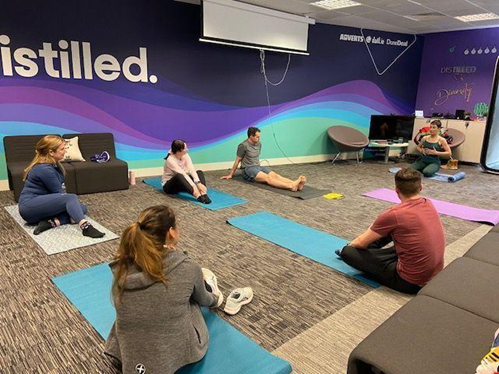
In the hustle and bustle of our daily lives, it's all too easy to overlook the essence of our wellbeing. This can be especially true at work - navigating deadlines while attempting to maintain a healthy work-life balance can be taxing to say the least. This is why it's so important for employers to prioritise their employees' wellbeing at work. When employees feel physically and mentally well, they are better equipped to meet the challenges of their roles with focus, creativity and resilience. This heightened level of engagement translates directly into improved productivity, reduced absenteeism, and higher employee retention rates.
We know it can be hard to know where to start or the best approach to take, so we've compiled 5 tips below to ensure your organisation can do the utmost for its employees' health and wellbeing.
Ensure managers are well-equipped
What managers do or don't do has a real impact. A recent study found that managers can influence an employee's mental health up to 70% (1) - more than a doctor and more than a therapist. This is why it is so important to make sure that managers are equipped for success.
This year, research collected by Irish Life helped bring focus to some worrying but key workplace trends:
-
Less than 35% of employees felt comfortable speaking to their manager about mental health
-
Just 30% of employees believed their managers had the skills and tools to support mental health needs at work
-
Where we know rates of addiction are on the increase, particularly in Ireland, only 29% felt comfortable speaking about addiction and workplace supports
-
And 32% of employees were fearful of negative repercussions if they were to open up and discuss their mental health needs
If employees feel their managers aren't equipped to help them, they then aren’t comfortable speaking up, bringing with this a lack of psychological safety in the workplace. It's for this reason that it's important to ensure people leaders have the skills, the tools and also the confidence to be able to support these conversations and address and manage psychological safety. Ensuring people leaders have these skills is a key component to wellbeing in the workplace.
This can be done through training managers on how best to engage with employees on this topic. Leaders should be educated on recognising signs of stress, burnout, and other wellbeing concerns among their team members. Providing them with the tools to identify these indicators enables early intervention and support. Training programs should also emphasise the importance of open communication and the creation of a safe and non-judgmental environment where employees can feel completely comfortable discussing their wellbeing.
Create an open door policy
If you want your employees to feel secure to speak with managers about these issues at work, there needs to be a certain level of trust. Your employees won’t want to speak with you if they feel they’re not going to be heard. By maintaining an open-door level of communication from the top down, your employees will feel they can come to you, and that it’s not just a policy written up for the sake of it, with no action taken thereafter.
For this, training is again key, as people leaders should be equipped with skills in empathetic leadership and active listening in order for the open door policy to actually be successful and employees to avail of it. Understanding the unique challenges and needs of each team member allows leaders to tailor their support strategies. Implementing wellness initiatives and flexible work arrangements, as well as promoting work-life balance, should also be integral components of the training.
Leaders also need in-depth guidance on promoting a positive organisational culture that values and prioritises wellbeing, from the top down. By instilling a culture that encourages self-care, emphasises mental health awareness, and provides resources for personal development, people leaders can play a pivotal role in creating a workplace where employees not only thrive professionally but also enjoy a holistic sense of wellbeing.
Provide resources for employees
Offering a range of employee resources demonstrates a commitment to supporting both the physical and mental aspects of employee wellness. This can include health and wellness programs that encompass fitness classes, nutritional workshops, and stress management sessions. Another measure is ensuring that employees have access to resources like counseling services. At Cisco, they have implemented "#SafeToTalk", a peer-to-peer space where people can talk openly about how they're feeling. It is monitored by their ER team in case there's anything that needs extra support, and additional resources are provided to employees on where to go depending on individual needs, alongside different webinars and seminars on throughout the year.
Value your employees’ wellbeing both remotely and on-site
Successful hybrid work models prioritise employees' wellbeing to prevent burnout, stress, and isolation associated with long commutes and inflexible working hours. In fact, 70% of employees in 2022 reported that remote and hybrid work practices help them achieve a better work-life balance. (2). A hybrid work setting can offer employees more flexibility with their schedules, giving them more time to engage in physical activity and prioritise their health and wellbeing. In other words, successful hybrid working models allow employees to have more control over their work schedules and environment.
With this in mind, Distilled's "Wellness Wednesday" initiative is a great way to promote employee well-being, bringing back life at the office and building positive relationships among colleagues in informal settings. By organising wellness activities and encouraging healthy habits, employees are provided with the support and resources they need to prioritise their physical and mental health on-site. Additionally, by fostering connections among colleagues in informal settings, employees can feel more connected to their team.

Distilled the 'Wellness Wednesday' initiative in our offices in Dublin and Wexford (Source: LinkedIn)
By creating a physical workspace that is supportive of employees' needs, companies can help reduce the risk of burnout and stress associated with long commutes and inflexible work arrangements. Adapting the office to accommodate the changing needs of hybrid work can play a vital role in supporting employees' physical and mental health, boosting their morale and productivity in the workplace.
CluneTech HQ revamping their office space shows a commitment to creating a collaborative and functional workspace. With open-plan flooring, comfortable seating options, and state-of-the-art presentation technology, the space is designed to support productivity and creativity. By utilising the resources available, companies can create a workspace that meets the needs of both remote and on-site employees in a hybrid work model.
Maintain a culture of recognition
Working long days can be taxing on anyone's mental health, and to feel underappreciated for doing so can create a risk of burnout for your employees. Recognition plays a pivotal role in shaping the emotional and psychological wellbeing of employees. It goes beyond a simple acknowledgment; it communicates that an individual's contributions are meaningful and integral to the success of the organisation. When employees receive acknowledgment for their hard work and contributions, it validates their efforts, instilling a sense of pride and accomplishment. This positive reinforcement then contributes to a more positive and motivated work environment.
Recognition can be promoted in a number of ways; through peer-to-peer recognition programmes, celebrating employee milestones; even just a simple "well done" can sometimes be all it takes to make employees feel their work is valued and not taken for granted. Recognition is also a key driver in creating a sense of belonging and camaraderie within the workplace. When employees feel appreciated by their colleagues and superiors, it can enhance their connection to the team and the organisation, promoting a supportive and inclusive environment.
For more information on how your organisation can earn Certification, check out our webinar below 👇
Check out more resources:
- 10 Figures to Convince a Leadership Team of the Importance of Culture
- Employee Appreciation Day: 7 Great Ideas to Give Back!
- 9 Tips on Improving Employee Experience by Building a Healthy Culture
- Mental Health Supports in the Workplace: A Mutually Beneficial Approach
- 9 Ways to Show Employees You Value Them
- How to Empower Women at Work
- A Great Workplace For All: Diversity & Inclusion Matters
About Great Place to Work®
Great Place to Work® is the global authority on workplace culture. We help organisations quantify their culture and produce better business results by creating a high-trust work experience for all employees. We recognise Great Place to Work-Certified™ companies and the Best Workplaces™ in more than 60 countries.
To join the thousands of companies that have committed to building high-trust company cultures that help them attract, retain and take care of their people, contact us about getting Certified™️ today.
Sources
(1) https://www.ukg.com/resources/article/mental-health-work-managers-and-money
(2) (2022) Majority of Employees prefer remote or hybrid work. https://www.wtwco.com/en-US/Insights/2022/04/majority-of-employees-prefer-remote-or-hybrid-work-despite-feeling-disconnected
 Argentina |
Argentina |  Australia |
Australia |  Austria |
Austria |  Belgium |
Belgium |  Bolivia |
Bolivia |  Brazil |
Brazil |  Canada |
Canada |  Central America & Caribbean |
Central America & Caribbean |  Chile |
Chile |  Colombia |
Colombia |  Denmark |
Denmark |  Ecuador |
Ecuador |  Finland |
Finland |  France |
France |  Germany |
Germany |  Global |
Global |  Greater China |
Greater China |  Greece |
Greece |  Hong Kong SAR |
Hong Kong SAR |  India |
India |  Ireland |
Ireland |  Italy |
Italy |  Korea |
Korea |  Luxembourg |
Luxembourg |  Mexico |
Mexico |  Nigeria |
Nigeria |  Norway |
Norway |  Paraguay |
Paraguay |  Peru |
Peru |  Poland |
Poland |  Portugal |
Portugal |  Qatar |
Qatar |  Saudi Arabia |
Saudi Arabia |  Singapore |
Singapore |  Sri Lanka |
Sri Lanka |  Sweden |
Sweden |  Switzerland |
Switzerland |  The Netherlands |
The Netherlands |  Turkey |
Turkey |  United Arab Emirates |
United Arab Emirates |  United Kingdom |
United Kingdom |  United States |
United States |  Uruguay |
Uruguay |  Venezuela |
Venezuela | %20}})
-4.png?width=2160&height=2160&name=2021_gptw_logo_primary_red%20(1)-4.png)









